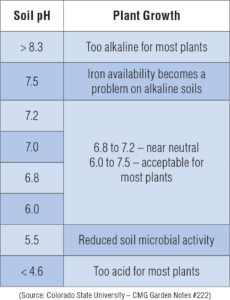Innovative technologies are changing agriculture, making it more sustainable and efficient. Here are some of the main approaches: Renewable energy: The introduction of solar panels, wind turbines and biogas systems in farms reduces dependence on fossil fuels and minimizes environmental impact. Zero ...
Soil pH regulates many chemical and biochemical reactions of soil that control nutrient absorption, plant growth, and productivity. Careful management of soil pH is necessary for soil vitality, crop yield, and quality. Each nutrient exhibits varying levels of solubility across the pH spectrum. HenceRead more
Soil pH regulates many chemical and biochemical reactions of soil that control nutrient absorption, plant growth, and productivity. Careful management of soil pH is necessary for soil vitality, crop yield, and quality. Each nutrient exhibits varying levels of solubility across the pH spectrum. Hence, it is necessary to maintain optimum soil pH for healthy plant growth.
a)Acidic Soil – (pH <7)
Soil acidity leads to reduced availability of various soil nutrients and toxicity of some . The nutrients applied through organic matter or fertilizers are either present in inaccessible form or eroded through leaching. The ability of microorganisms to degrade organic matter decreases dramatically.
b)Alkaline Soil – (pH >7)
Due to the high pH level, the soil often lacks nutrients like Fe, Zn, Mn, and Cu despite the high mineral content. It causes certain minerals to become chemically bound in the soil, making them less available to crops and resulting in poor growth and productivity
c)The physical, chemical, and biological aspects of soil improve with a pH nearly neutral.
d)Undesirable soil pH also leads to – (a) Poor flower and fruit setting (b) Nutrient deficiencies in crops (c) Abnormal leaf pigmentation (d) Insufficient nodulation in legumes (e) Decline in beneficial microbes population and rise in pathogenic organisms

Effect of soil pH on plant growth


Tractors: Tractors are used to plow fields, plant seeds, and harvest crops. they are an essential piece of equipment on many modern farms. Irrigation systems: Irrigation systems allow farmers to water their crops using sprinklers, drip irrigation, or centre-pivot irrigation. Cover Cropping: PlantiRead more
Tractors: Tractors are used to plow fields, plant seeds, and harvest crops. they are an essential piece of equipment on many modern farms.
Irrigation systems: Irrigation systems allow farmers to water their crops using sprinklers, drip irrigation, or centre-pivot irrigation.
Cover Cropping: Planting cover crops during the off-season prevents soil erosion, improves soil health, and enhances biodiversity. Cover crops can also fix nitrogen in the soil.
GIS Technology: Geography Information Technology is a system that allows the mapping and analysis of farm fields. This technology helps in soil sampling, crop scouting, etc.
See less